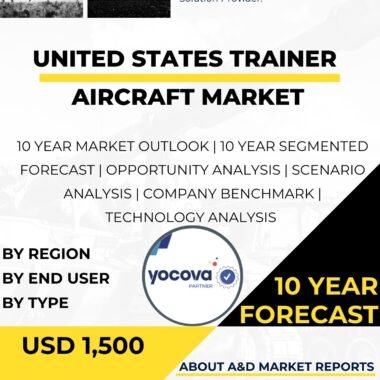Description
The Saudi Arabia Search and Rescue (SAR) Helicopter Market plays a crucial role in the country’s aviation and emergency response infrastructure. SAR helicopters are specialized aircraft designed to conduct aerial search and rescue operations, providing critical assistance in locating and evacuating individuals in distress or during emergencies. As a key player in the Middle East region, Saudi Arabia recognizes the strategic importance of acquiring and developing advanced SAR helicopter capabilities to enhance its emergency response capabilities, safeguard its citizens and visitors, and protect its national security interests.
The Saudi Arabia SAR Helicopter Market is characterized by a mix of international and domestic helicopter manufacturers and operators. International helicopter manufacturers, such as Airbus Helicopters, Leonardo Helicopters, and Sikorsky (a Lockheed Martin company), have a significant presence in the market and offer a wide range of SAR helicopter solutions.
One of the primary drivers of the Saudi Arabia SAR Helicopter Market is the Saudi government’s focus on public safety and emergency response. SAR helicopters play a critical role in supporting various emergency situations, including search and rescue operations for lost or injured individuals, medical evacuations from remote or inaccessible locations, firefighting support, and disaster relief efforts during natural calamities.
Moreover, as a nation that hosts millions of pilgrims during the annual Hajj and Umrah seasons, Saudi Arabia recognizes the importance of maintaining robust SAR capabilities to ensure the safety and well-being of visitors. SAR helicopters are instrumental in responding to emergencies during these religious events, providing timely assistance to those in need.
The Saudi government’s Vision 2030 economic diversification plan also influences the SAR Helicopter Market. As part of this vision, Saudi Arabia aims to develop a robust domestic aerospace industry capable of contributing significantly to the national economy. This includes fostering partnerships and joint ventures with international helicopter manufacturers for technology transfer and knowledge sharing.
Localization of SAR helicopter manufacturing aligns with the broader goal of creating high-skilled job opportunities for Saudi citizens and promoting research and development within the country.
These helicopters are versatile and well-suited for a wide range of SAR missions, including long-range searches, medical evacuations, and transporting rescue personnel and equipment.
Light SAR helicopters are ideal for quick-response missions in urban and semi-urban areas, providing agile and efficient support during emergencies.
Heavy-lift helicopters are designed for carrying heavy equipment and performing complex rescue operations, such as airlifting large numbers of people during natural disasters.
The Saudi Arabia SAR Helicopter Market faces several challenges and opportunities. Developing and acquiring advanced SAR helicopters requires substantial financial investment and continuous research and development efforts to stay at the forefront of technological advancements. The Saudi government must balance its operational requirements with budget constraints to ensure the acquisition of cost-effective and state-of-the-art SAR helicopter solutions.
Moreover, SAR helicopter operations demand highly skilled pilots, rescue personnel, and maintenance crews, necessitating comprehensive training programs and ongoing skill development to ensure the readiness of SAR teams.
The Saudi Arabia SAR Helicopter Market also faces challenges related to adverse weather conditions, particularly in the desert regions of the country. Extreme temperatures, sandstorms, and limited navigational aids can affect SAR operations, requiring specialized equipment and training to overcome these challenges.
In recent years, the Saudi Arabia SAR Helicopter Market has witnessed technological advancements that enhance SAR capabilities. The development of advanced sensors, imaging systems, and communication technology has significantly improved SAR missions’ efficiency and effectiveness. Enhanced situational awareness and real-time data sharing empower SAR crews with critical information to conduct successful rescue operations.
Furthermore, the integration of SAR helicopters with unmanned aerial systems (UAS) or drones provides an additional layer of support for search and reconnaissance activities. Drones can cover larger areas, access difficult terrains, and support SAR operations in challenging environments, making them valuable assets in the SAR helicopter toolkit.
The Saudi Arabia SAR Helicopter Market also plays a significant role in supporting the country’s border security efforts. SAR helicopters are instrumental in locating and assisting individuals attempting to cross the country’s vast borders, helping to prevent illegal immigration and trafficking activities.
To address these challenges and take advantage of the opportunities, the Saudi government is investing in SAR infrastructure and capabilities. Expanding SAR bases, upgrading equipment, and providing continuous training for SAR crews are critical elements of this effort. Additionally, the government is exploring collaborations with international SAR experts to exchange best practices and adopt innovative technologies to enhance SAR operations.
In conclusion, the Saudi Arabia Search and Rescue Helicopter Market is a vital and evolving component of the country’s aviation and emergency response infrastructure. As the Saudi government continues to prioritize public safety and emergency response, the demand for advanced SAR helicopter capabilities is expected to grow.
International helicopter manufacturers with expertise in SAR helicopter development and manufacturing will continue to play a significant role in this market. However, the Saudi government’s focus on economic diversification and indigenous aerospace industry development will drive increased collaboration and technology transfer initiatives.
By fostering local research and development, training programs, and investments in SAR helicopter technology and infrastructure, Saudi Arabia aims to build a robust and self-sufficient SAR helicopter industry, ensuring rapid and effective emergency response capabilities.
As the Kingdom seeks to enhance its emergency response capabilities, protect its citizens and visitors, and bolster its national security interests, the Search and Rescue Helicopter Market will remain a critical area of focus within the broader aviation and public safety efforts.




